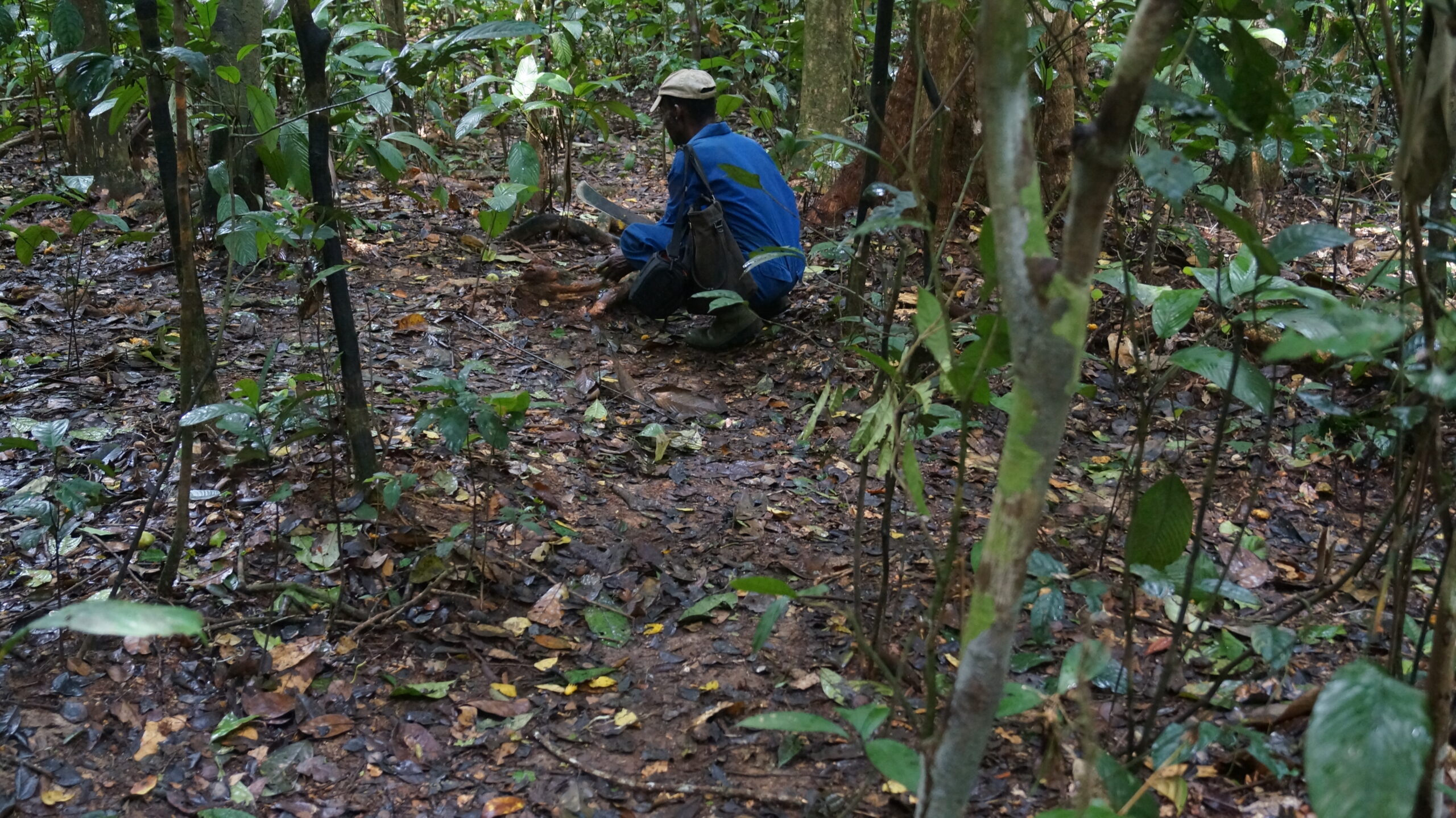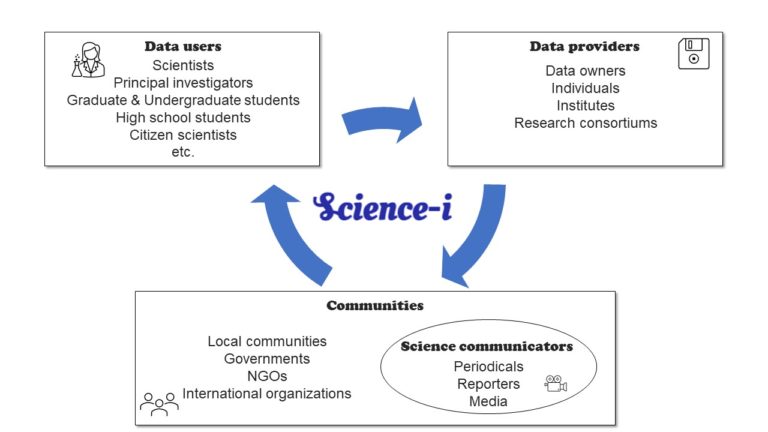empower research, enrich diversity
Science-i is a global research metaverse.
Science-i is equipped with three unique assets — i) the largest global forest inventory database, ii) the most extensive global network of forest experts, and iii) the most advanced cyberinfrastructure with dynamic data governance.
Science-i accelerates science by empowering underrepresented communities in global research and knowledge co-production.

We empower research in biodiversity sciences and beyond, with AI, big data, and world-class expertise; We support team and consortiums, e.g. GFBI, with global data infrastructure and high-performance computing
We enrich diversity in biodiversity sciences, by supporting under-represented scientists and communities worldwide


Our History
Since 2016, Science-i, together with sister consortium GFBI, have empowered 500+ scientists from around the world to conduct top-tier research
-2016: Team collaboration on the first GFBI project on the relationship between forest diversity and tree productivity worldwide
-2017: The first global congress of GFBI was held in Beijing China, with the participation from 100+ scientists from across the world
-2018: The completion of the first forest inventory database with global coverage (GFBi) was completed
-2019: The number of GFBI members exceeded 200
-2020: GFBI has published 15+ research papers with a global collaboration approach and algorithm that become the basis of the Science-i web-based platform.
-2022 (April): Science-i website (beta testing site) first came online
-2022 (June): The number of Science-i members exceeded 200
Science-i = "Science" + "i"
Science-i offers an interactive social-media-like dashboard where researchers are connected to collaborators and data contributors across the world, and conduct their work across the full research lifecycle. The concept is compelling in its promotion of transparency, data provenance, traceability, and reproducibility of results, since it supports the organization, capture, preservation, and publication of scientific workflows end-to-end. We designed Science-i to be effective across science domains, and our user community spans increasingly diverse disciplines.
"Science"
Ensemble research is the scientific research that is enabled by mammoth data and expertise en masse, as well as state-of-the-art computing support. Ensemble research is enabled by an international network of people and data, and is underpinned by innovative and solid research ideas.
"i"
– Individual: we are here to support scientific research for you and everyone on an individual basis
– International: we come from every corner of the world
– Interdisciplinary: we profess various areas of expertise
– Intelligent: we conduct research based on collaborative intelligence where humans and AI are joining forces
– Independent: we operate as a non-profit research organization independent of non-scientific governmental or commercial influences
How does it work?
We offer a global AI-assisted platform that connects data providers, data consumers, and communities. This is an important step to advance scientific discoveries, as a disconnection between data users and data owners have been a major obstacle to science.

Our Solution
- The largest global forest inventory database,
- The most extensive global network of forest experts,
- The most advanced cyberinfrastructure with dynamic data governance.
Benefits to Data Users
Global data supply
Increased research productivity
Transparent and secure collaboration
- Data users, such as scientists and communities who need data to support their research or decision-making, are supplied with the data they need;
- Our global forest inventory database and other global datasets enable or strengthen research and decision-making from local to global scales;
- Real-time connection with data suppliers and data collectors facilitates information exchange to further strengthen research and decision-making;
- Data users are provided with a FAIR platform via Science-i to conduct international research collaboration in a transparent and secure manner.
Benefits to Data Owners
Authorship
Increased data usage and public awareness
- Data owners, such as data collectors, data compilers, and data contributors, are recognized for their work on the data with authorship in all associated Science-i publications;
- Science-i increases the public access to the data, in a secure and mutually beneficial manner;
- Research and decision-making projects promote the public awareness of the data and data owners.
Benefits to Communities
Diversity and inclusion
Inputs and influences on research projects
- Through members and Community Advisors, communities oversee, evaluate, and advise all the research projects in terms of potential impacts on and applications for local communities;
- Science-i promotes participation from underrepresented communities to increase diversity and inclusion in biodiversity sciences and beyond.
Quality Control
For Science
For Community
- The quality of our research and science is first-handedly guarded by our Science Advisors and all project members;
- The quality of our research and science is also examined and scrutinized by external journal editors and ad hoc reviewers;
- We work diligently with our Community Advisors and communities for research dissemination and education;
- We also work diligently with our Community Advisors and communities to avoid exploitative research practices such as “helicopter research” and “ethics dumping.”
Science-i protocols
- Any full member of Science-I can propose a new research project;
- Any full member can apply to join a new research project, and contribute to this project using their specific expertise and/or research data;
- The principal investigator or organizer of a research project can invite or accept any members who are willing to participate in this project as co-authors;
- The organizer is the signatory party of a research project and is responsible for leading the scientific collaboration and all research publications associated with this project.
- To ensure quality and inclusion, all research projects under Science-I are overseen and closely monitored by two advisory groups: Science Advisors and Community Advisors;
- Science-I can also support a research project with data and high-performance computing.
For a complete list of our Service Team and Advisors, please visit Science-i Team.
Our members carry a wide spectrum of expertise
Our members are diverse in geographic and cultural backgrounds
- Argentina: 2
- Australia: 10
- Austria: 3
- Belgium: 10
- Benin: 2
- Bolivia: 1
- Brazil: 16
- Brunei: 1
- Burkina Faso: 2
- Burundi: 1
- Cameroon: 4
- Canada: 8
- Chile: 1
- China: 31
- Colombia: 2
- Costa Rica: 1
- Czech Republic: 10
- Democratic Republic of the Congo: 3
- Denmark: 8
- Ecuador: 2
- Estonia: 3
- Finland: 4
- France: 5
- French Guiana: 2
- Gabon: 1
- Germany: 8
- HongKong: 1
- India: 17
- Indonesia: 1
- Italy: 20
- Ivory Coast: 6
- Japan: 2
- Kenya: 3
- Mexico: 6
- Nepal: 3
- Netherland: 11
- New Zealand: 2
- Norway: 1
- Panama: 1
- Poland: 7
- Portugal: 1
- Republic of the Congo: 1
- Russia: 16
- Serbia: 2
- Sierra Leone: 1
- Slovakia: 1
- South Africa: 4
- South Korea: 2
- Spain: 5
- Sweden: 1
- Switzerland: 9
- Tanzania: 1
- Turkey: 1
- Uganda: 1
- UK: 12
- US: 53
- Vietnam: 1
Benin, Burkina Faso, Burundi, Cameroon, Democratic Republic of the Congo, Gabon, Ivory Coast, Kenya, Republic of the Congo, Sierra Leone, South Africa, Tanzania, Uganda
Brunei, China, HongKong, India, Indonesia, Japan, Nepal, South Korea, Vietnam
Austria, Belgium, Czech Republic, Denmark, Estonia, Finland, France, Germany, Italy, Netherland, Norway, Poland, Portugal, Russia, Serbia, Slovakia, Spain, Sweden, Switzerland, Turkey, UK
Australia, New Zealand
Canada, Mexico, USA
Argentina, Bolivia, Brazil, Chile, Colombia, Costa Rica, Ecuador, French Guiana, Panama
